What are the two postulates of special relativity? (Choose two answers.) A In any closed system, the total momentum will not change. F=ma The entropy of an isolated system will always increase over time. The speed of light is the same regardless of the speed of the observer or the speed of the source. Light travels to us from the hands of the clock. If we could move away from the clock at the speed of light, time will appear to stand stilI. If you measure both the position of a particle and its momentum, then the product of the F) uncertainties of these two measurements must always be at least half of the reduced Planck's constant. For all possible paths between two points, the actual trajectory is the one that results in the action being minimized.
What are the two postulates of special relativity? (Choose two answers.) A In any closed system, the total momentum will not change. F=ma The entropy of an isolated system will always increase over time. The speed of light is the same regardless of the speed of the observer or the speed of the source. Light travels to us from the hands of the clock. If we could move away from the clock at the speed of light, time will appear to stand stilI. If you measure both the position of a particle and its momentum, then the product of the F) uncertainties of these two measurements must always be at least half of the reduced Planck's constant. For all possible paths between two points, the actual trajectory is the one that results in the action being minimized.
Modern Physics
3rd Edition
ISBN:9781111794378
Author:Raymond A. Serway, Clement J. Moses, Curt A. Moyer
Publisher:Raymond A. Serway, Clement J. Moses, Curt A. Moyer
Chapter16: Cosmology
Section: Chapter Questions
Problem 11P
Related questions
Question

Transcribed Image Text:What are the two postulates of special relativity? (Choose two answers.)
A
In any closed system, the total momentum will not change.
B
F=ma
(c) The entropy of an isolated system will always increase over time.
The speed of light is the same regardless of the speed of the observer or the speed of the source.
Light travels to us from the hands of the clock. If we could move away from the clock at the
speed of light, time will appear to stand still.
If you measure both the position of a particle and its momentum, then the product of the
F
uncertainties of these two measurements must always be at least half of the reduced Planck's
constant.
For all possible paths between two points, the actual trajectory is the one that results in the
action being minimized.
Expert Solution
This question has been solved!
Explore an expertly crafted, step-by-step solution for a thorough understanding of key concepts.
Step by step
Solved in 2 steps with 1 images

Knowledge Booster
Learn more about
Need a deep-dive on the concept behind this application? Look no further. Learn more about this topic, physics and related others by exploring similar questions and additional content below.Recommended textbooks for you

Modern Physics
Physics
ISBN:
9781111794378
Author:
Raymond A. Serway, Clement J. Moses, Curt A. Moyer
Publisher:
Cengage Learning

Modern Physics
Physics
ISBN:
9781111794378
Author:
Raymond A. Serway, Clement J. Moses, Curt A. Moyer
Publisher:
Cengage Learning